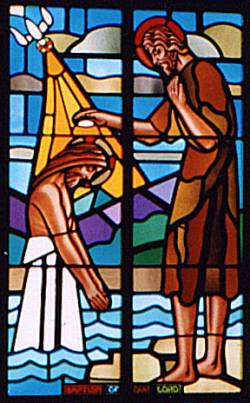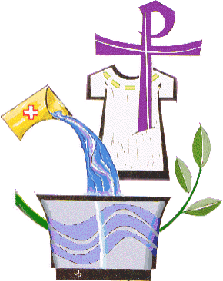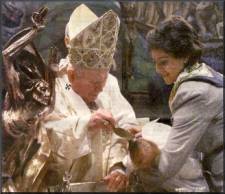
Part Two: Channels of Grace
Baptism
 Baptism was already prefigured in the Old Testament. Some of
the ancient rites or events that anticipated Christian Baptism were
circumcision (Colossians 2:11), the march of the Israelites through the Red Sea
(I Corinthians 10:2), and across the Jordan (Joshua 3:14). What the church
considers a formal prophecy of baptism was the oracle of Ezekiel regarding the
New Israel.
Baptism was already prefigured in the Old Testament. Some of
the ancient rites or events that anticipated Christian Baptism were
circumcision (Colossians 2:11), the march of the Israelites through the Red Sea
(I Corinthians 10:2), and across the Jordan (Joshua 3:14). What the church
considers a formal prophecy of baptism was the oracle of Ezekiel regarding the
New Israel.
I shall pour clean water over you and you will be cleansed. I shall cleanse you of all defilement and all your idols. I shall give you a new heart and put a new spirit in you (Ezekiel 36:25). An immediate preparation for the Baptism instituted by Christ was the baptism administered by St. John, which moved those who received it to repentance for their sins. This in turn prepared them for divine forgiveness. But John’s baptism did not itself remove sins, unlike the sacrament of Baptism which directly causes the remission of the guilt and punishment of all sin.
Institution by ChristWe cannot tell from the Scriptures exactly when Christ instituted the first sacrament. According to St. Bonaventure, the Savior decided on the material to be used when He was Himself baptized by John in the Jordan; He began to communicate the graces of baptism when He rose from the dead; He determined how the sacrament should be given when He commanded the apostles to baptize in the name of the Holy Trinity; He merited the graces to be conferred at baptism during His Passion and death on the Cross; and He foretold its purpose and necessity, during His conversation with Nicodemus as recorded in the Fourth Gospel (John 3:1-21). A Catholic may not doubt that Christ instituted the sacrament of Baptism or say “that the Roman Church, which is the mother and teacher of all churches, does not have the true doctrine concerning the sacrament of Baptism” (Council of Trent, March 3, 1547). The Church’s teaching on this sacrament is precise and extensive. One reason is that Baptism is the most fundamental of the seven sacraments. We may say it is also a model for all the sacraments in terms of their power to confer or deepen the supernatural life of the soul. To understand how Baptism operates is to see how all the sacraments are effective signs of divine grace.
What is Baptism?A very clear and up-to-date definition of this sacrament is provided by the new Code of Canon Law issued by Pope John Paul II on January 25, 1983, the feast of the conversion of St. Paul. After quoting the definition, we shall briefly analyze its principal elements. Baptism, the gateway to the sacraments, is necessary for salvation by actual reception or at least by desire. By it people are freed from sins, are born again as children of God and, made like to Christ by an indelible character, are incorporated into the Church. It is validly conferred only by a washing in real water with the proper form of words used (Canon 849). The first thing that strikes us in this definition is that Baptism is the gateway (Latin janua = door) to the sacraments. In other words, no other sacraments can be received except by a person who has been baptized.
In saying that baptism is necessary for salvation, the Church is telling us that the obligation applies to all human beings without exception. Unless they are reborn through the grace of baptism, they cannot attain the beatific vision. Christ’s teaching on the universal necessity of baptism has been interpreted by the Church to mean that in case of emergency baptism by water can be replaced by baptism of desire or baptism by blood. Baptism of desire is the explicit or at least implicit desire for sacramental baptism and is associated with perfect sorrow for one’s sins, that is, contrition based on charity or the love of God. Baptism of blood means the patient endurance of a violent death because of one’s profession of the Christian faith or the practice of Christian virtue. Even young children can receive baptism of blood, as is clear from the Church’s honoring the Holy Innocents who entered heaven after they were murdered by Herod at the time of Christ’s birth in Bethlehem. The Church has never wavered, however, in insisting that even children before the age of reason must receive baptism of water. Thus, in the famous definition of Pope Benedict XII referred to before, he states explicitly which persons attain to the beatific vision. They are the souls of “all the saints” who died before the Passion of Christ. They are also those of the “faithful who died after receiving the Holy Baptism of Christ,” provided they needed no purification after death or had been duly purified in purgatory. Then the crucial statement that, “The same is true of the souls of children who have been reborn in Baptism when they die before attaining the use of free will” (Constitution Blessed God, January 29, 1336). This historic declaration is introduced by the words, “According to the usual providence of God.” Consequently, we leave to God’s mercy the eternal destiny of those who die without baptism before reaching the age of discretion. But historically the Church has never given her official approval to any theory that substitutes for infants some other way of attaining the beatific vision other than baptism of water. Moreover, the Church has condemned as “false”, the Jansenist denial of a limbo of children. This would be a place of perfect, natural happiness but without the face-to-face vision of God (Pope Pius VI, in The Author of Faith, August 28, 1794). The Church’s law on the duty of baptizing infants is emphatic. Parents are obliged to see that their infants are baptized within the first few weeks. As soon as possible after the birth, indeed, even before it they are to approach the parish priest to ask for the sacrament for their child. In fact “if the infant is in danger of death, it is to be baptized without delay” (Canon 867).
Effects of BaptismThe Church identifies four main effects of the sacrament of Baptism, namely: removal of sin, rebirth as a child of God, assimilation to Christ, and incorporation into the Church. Each of these deserves at least a short explanation.
After all, this is what really happened when our first parents sinned. They lost the supernatural life and virtues and gifts they had possessed before they fell. By their sin they lost these graces not only for themselves but for their descendants. What then, does Baptism do? It restores the essential graces that Adam and Eve did not pass on to their posterity. By restoring these graces Baptism removes the inherited sin. What graces are restored? All the supernatural gifts which our first parents had in what we call “original justice.” Baptism restores the uncreated grace of the Indwelling Trinity, sanctifying grace, the infused theological virtues, and the gifts of the Holy Spirit. Restored too, are the fruits (Latin frui, to enjoy) of the Holy Spirit which are the enjoyable experiences we have when we put the virtues and gifts into action. St. Paul identifies twelve such experiences when he compares “the works of the flesh” with their opposites. “The fruit of the Spirit” he says, “is charity, joy, peace, patience, benignity, goodness, longanimity, mildness, faith, modesty, continency, chastity” (Galatians 5:22-23). This is not an exhaustive list of the fruits of the Holy Spirit. It is rather a series of examples of virtues that when practiced, give us spiritual ease and satisfaction in doing the will of God. If the person baptized is older and therefore has committed personal sins, these too are totally removed, both in their guilt (or loss of grace) and their penalty (suffering due). This includes the remission of all mortal sins along with their debt of eternal punishment. Supernatural Rebirth. In positive terms, the sacrament of Baptism makes us adopted children of a loving God. There is only one natural conception and birth for us human beings. But thanks to the suffering and death of Jesus Christ we have access to a second origin as adopted children of God’s own divine community, which is the Holy Trinity. This second now supernatural origin takes place the moment we are baptized. Likeness to Christ. What makes us like Christ is the indelible character we described in our earlier reflections on the sacraments in general. As we saw, the sacraments of Baptism, Confirmation and Holy Orders each confer their own distinctive supernatural character. The distinctive quality of the baptismal character is to give a person a twofold share in Christ’s own priestly power. The first is a share in Christ’s power to offer Himself in sacrifice to the heavenly Father. The second is a share in Christ’s power to communicate to others the graces that He gained for the world by His death on Calvary. Incorporation into the Church. The two expressions “incorporation into Christ” and “incorporation into the Church” are used almost interchangeably. Yet there is some difference between them. Incorporation by Baptism into Christ is basically what we mean by being assimilated to Christ’s priesthood, as just described. Incorporation into the Church builds on being incorporated into Christ. But it goes beyond this. Baptism makes a person part of the Mystical Body of Christ which is His Church. The one baptized receives certain rights and privileges, and duties that no one else can claim. Christ who is the Head of His Church works on those who are baptized and through them to continue His great work of salvation. In a profound sense, they are a continued extension, or an extended continuation, of Himself as Redeemer of the human race. Whatever a baptized person does for the rest of his life on earth builds on this foundation. Why? Because Baptism entitles a person to a lifetime of extraordinary actual graces that no one else can expect to receive from God.
The Ritual of BaptismThe essential rite of Baptism has not changed since Christ told His disciples: “All power is given to me in heaven and on earth. Go, therefore, teach all nations, baptizing them in the name of the Father, and of the Son, and of the Holy Spirit” (Matthew 28:18-19). No significant liturgical change was introduced by the Second Vatican Council. However, certain modifications were made to the new Code of Canon Law. Only two ways of baptizing are now allowed, namely “by immersion or by pouring.” Previously Canon Law offered a third option, by sprinkling (Canon 854). Also, previously it was required that a Christian name be given to the one being baptized. The new Code simply says that “a name foreign to a Christian mentality is not given” (Canon 855). 
Copyright © 2002 Inter Mirifica
Pocket Catholic Catechism |
 It means that a baptized person has a unique title which
belongs to no one else. It is the title to those graces which Christ reserves
exclusively to baptized people. Even if a person has lost God’s friendship
through grave sin, and perhaps lost every vestige of faith by denying God’s
revealed truth, yet the ability to receive the other sacraments remains. This,
of course, presumes that the necessary conditions are fulfilled.
It means that a baptized person has a unique title which
belongs to no one else. It is the title to those graces which Christ reserves
exclusively to baptized people. Even if a person has lost God’s friendship
through grave sin, and perhaps lost every vestige of faith by denying God’s
revealed truth, yet the ability to receive the other sacraments remains. This,
of course, presumes that the necessary conditions are fulfilled. Removal of Sin. The best way to
explain the removal of sin by Baptism is to understand that the sacrament
confers divine grace.
Removal of Sin. The best way to
explain the removal of sin by Baptism is to understand that the sacrament
confers divine grace.